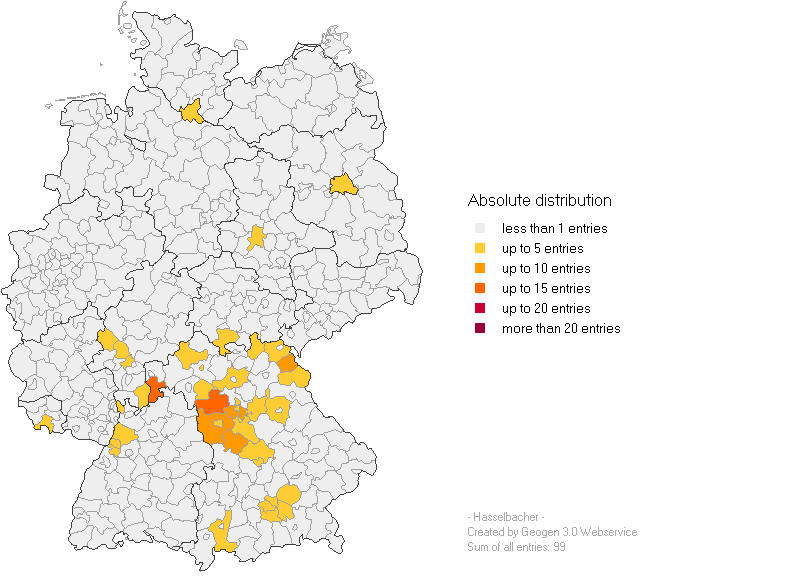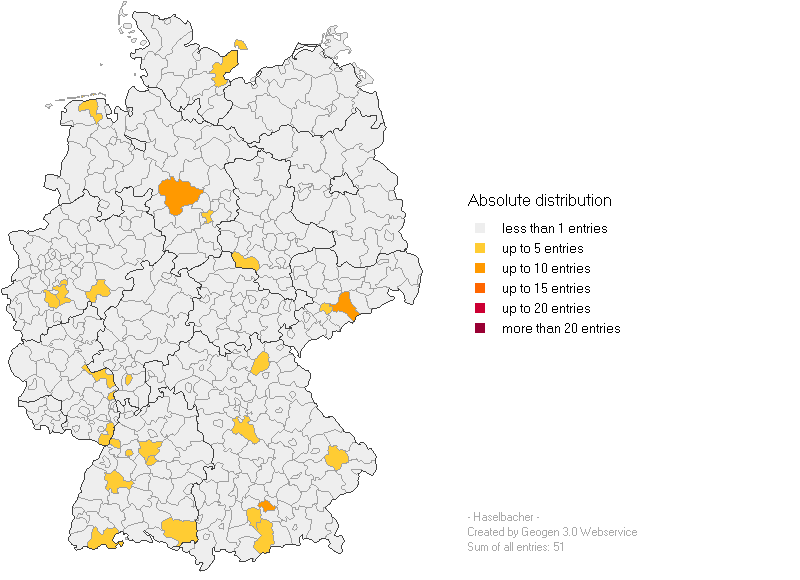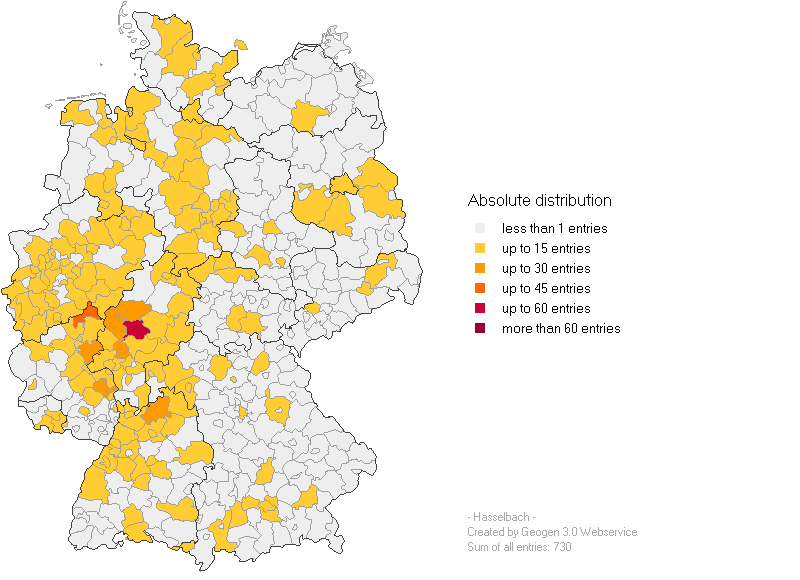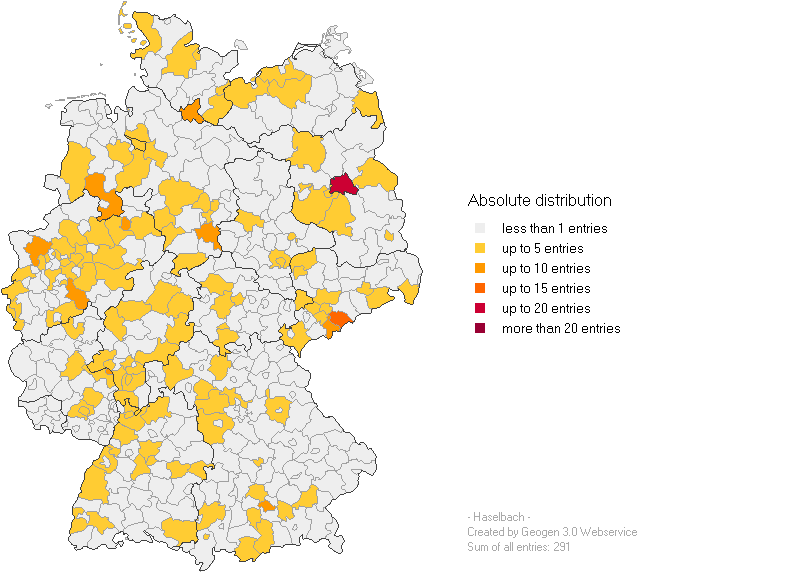Below are Geomaps of the absolute counts of phone listings for the variants of Hasselbacher and Hasselbach in Germany taken from the Geogen website.
Hasselbachers are clustered in my ancestral Mittelfranken homeland around Neustadt/ Bad Winsheim, Ansbach, Fürth, and Gunzenhausen. There is a smaller cluster to the west around Miltenberg and in the south. (See also the breakdown by Landkreise here for Hasselbachers.)
The less frequent Haßelbachers seem focused just outside the western range of the Hasselbachers.
The Haselbachers are all over the map with a numerical cluster to the north in Hannover, and to the east in Freiberg.
Hasselbacher n= 99

Haßelbacher n= 30

Haselbacher n= 51
The Hasselbachs are heavily localized in the western half of the country with a heavy concentration in Landkreis (county) Gießen.
The Haselbachs have a similar distribution but with notable concentrations in the east in Berlin and Erzgebirgskreis.
Hasselbach n= 730
Haselbach n=291

Further Discussion
What can we make of this? I am struck with the lack of overlap of Hasselbachers and Haselbachers. Certainly in the past three centuries, there was a greater variation of spelling in Mittelfranken and Nürnberg. Members of my own family line just 100 years ago seemed almost to use ss or ß interchangeably. On their marriage record, my grandfather signed one way, and my grandmother the other! Although there appears to be the occasional use of a single s in the earliest years in Mittelfranken, as time went by, the vast majority of the different family lines settled on the ss and ß. Whether this had something to do with regional dialect, spelling customs, pronunciation or something else indeed, I have no idea. The fact that there are still some modern Haßelbachers isolated out on the western fringe of the main body seems to be compatible with such a concept of evolutional conversion.
Certainly there are some Hasselbachers outside Mittelfranken today. Some migration over three centuries is to be expected, but it has not yet erased he imprint on the original homeland of the Exulanten. Additionally, some of the earlier Hasselbachers worked for the railroad that placed them to the west in places like Rotenberg.
I wish to raise another possibility though. I am communication with a family of former Nürnberg Hasselbachers who believe they are from the Hallertau region of Germany between Nürnberg and Munich. They also believe their ancestors came from Gresten. It is possible that a Hasselbacher from the north moved to the south, but it is also possible that one or more of the Exulanten dropped out along the way to Mittelfranken, or had another destination in mind from the beginning. I recently found two Hasselbachers who in the early 1700s settled in Neustadt from southern Bavaria. The same arguments can be made about their origins. Perhaps they were rejoining old relatives. Someday I hope to have better answers.
Hasselbachers vs. Hasselbachs.
I am also struck with the lack of overlap of Hasselbachers and Hasselbachs. I have never seen an example of where a Hasselbacher of any flavor shortened their name to Hasselbach. It seems to me that those are two very separate family names. Both species probably derive from various towns, rivers, or other places named Hasselbach.
How many places named Hasselbach or Haselbach are there?
In my earlier analysis, I used Google Map to count the number of places named Hasselbach or Haselbach in Germany and Austria. The principal conclusion was that while there were several of each village in Germany, all the villages in Austria were named Haselbach. This observation paralleled the way people spelled their name in Austria.
I tried to redo a village count for today's analysis and was both puzzled and disappointed. A Google Map search returned less than 4 possibles in Germany, and only a single one for Austria, many fewer than two years ago. I cannot explain this yet and looked for other sources. I found a spectacular one!
Through ancestry.com I have access to the huge Meyers Gazetteer of the German Empire published in 1912. In Germany, there were 9 villages, hamlets, and house-groups named Hasselbach, but 30 named Haselbach! Additionally, there were numerous places with a dozen Hassel- variations such as Hasselhof, Hasselmühle, Hasselberg, Hasselback, Haselgraben, and even a Hasselbacherhof. I do not yet have a similar source for Austria.
The next step will be to locate these places on the map to test the hypothesis that Hasselbachers and Haselbachers came from some of these places. In theory this will be possible, but in the dense text (written in old black-face print) a plethora of abbreviations are used for each entry. A glossary is provided, but I do not have time for the task right now. If there is anyone who wants to take this on, I can provide copies of the actual pages. For now, I will place summary lists of the names on another page.